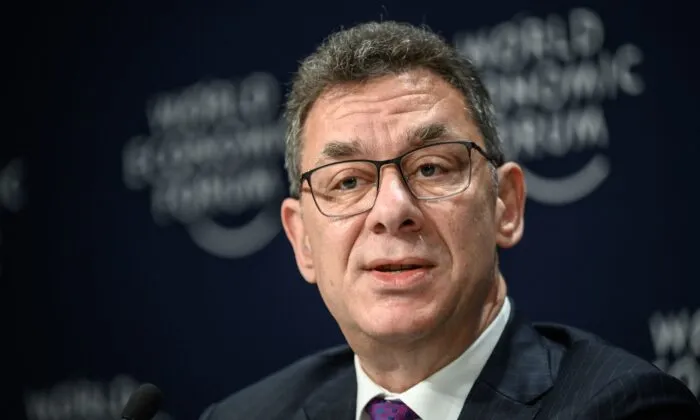Pfizer CEO Dr. Albert Bourla has made “misleading” and unsubstantiated statements on the merit of giving COVID-19 vaccines to young school children, according to a case report published by the UK’s pharmaceutical watchdog on Friday.
During an interview with the BBC published on Dec. 2, 2021, Bourla was asked whether he believed it was likely that 5-to 11-year-olds in the UK and Europe would be vaccinated against COVID-19 and whether it was a good idea.
The interview was published after the U.S. Food and Drug Administration authorised the use of Pfizer-BioNTech COVID-19 vaccine on the primary schoolers, but the UK’s medicines regulator, Medicines and Healthcare products Regulatory Agency (MHRA), didn’t approve the product for the same age group until Dec. 22, 2021.
While acknowledging that it was up to the UK authorities to decide on whether or not to approve and deploy the vaccines, Bourla replied, “I believe it’s a very good idea.”
He cited the disruptions in education and the potential of developing long-COVID, saying, “so there is no doubt in my mind about the benefits completely [completely] are in favour of doing it.”
After Pfizer appealed against the rulings, an appeal board upheld five counts of breaches of three ABPI codes that require information and claims to be accurate, balanced, capable of substantiation, not raising unfounded hopes of successful treatment, and not be misleading with respect to the safety of the product.
The PMCPA described Bourla’s statement as being of a “strong unqualified nature.” It also said they inferred there was “no need to be concerned about potential side-effects of vaccination in healthy children aged 5-11” and that the implication was “misleading and incapable of substantiation.”
The PMCPA said it has received an undertaking from Pfizer to prevent similar breaches in the future.
Code breakers are charged for administrative costs, but the self-regulatory body does not have the power to impose fines or other legal sanctions.
Bourla was initially found to have also breached the code for promoting the Pfizer-BioNTech vaccine in the 5–11 age group when it was not authorised by the MHRA, but the appeal board overturned the ruling, agreeing with Pfizer that its CEO was asked a specific question and it was not unreasonable to talk about the issue in principle. The board also noted that two other COVID-19 vaccines were also under investigation for the age group.
Most Serious Rulings
Pfizer didn’t respond to The Epoch Times’ request for comment. In a previously statement send to The Telegraph in November 2022, when the newspaper got hold of the unpublished ruling, a spokesman for Pfizer said the company was “committed to the highest levels of integrity in any interaction with the public.”
“We are pleased the UK’s PMCPA Appeal Board found Pfizer to have maintained high standards and upheld confidence in our industry, the two most serious rulings in this complaint from a UK campaign group,” the statement reads.
“In the UK, we have always endeavoured to follow the principles and letter of our industry Code of Practice throughout. We will review the case report in detail when we receive it, to inform future activity,” it added.
Speaking to The Epoch Times on Tuesday, Ben Kingsley, head of legal affairs at UsForThem, said he was “thrilled” the regulator ultimately agreed with them that Pfizer CEO’s statements were misleading and unsubstantiated after the pharmaceutical giant opposed their claims “with all of the resources at its disposal” throughout the process.
“I think to the average member of the public, we’d regard misleading us about the safety of their product to be plenty more serious than bringing the repute of the pharmaceutical industry down,” he said.
“So I think it tells you something about the mindset and the priorities of pharma executives that they regard the abuse of the industry as being a more serious matter than misleading the public.”
In June 2021, the UK government’s advisory body on vaccines, the Joint Committee on Vaccination and Immunisation declined to recommend COVID-19 vaccines for healthy children aged between 12 and 15 , given the “marginal” benefits young teens could get from the vaccines and the lack of long-term data on the side-effects including myocarditis.
But the vaccines were later offered to the age group after Chief Medical Officers made a recommendation based on wider considerations, including the disruption to children’s education—a disruption attributed by some to the disease and by other to the political decision to make children who test positive stay out of school.
The JAVI later recommended a one-off “non-urgent offer” to vaccinate 5- to 11-year-olds. The offer ended in August last year.
In is most recent recommendation, the JCVI said under–50s who are at lower risk of getting seriously ill with COVID-19 will soon be unable to get a booster shot. The offer of primary doses will also end for low-risk people in all age groups.
Source: The Epoch Times



